Friday, September 30, 2011
 Derek Batchelor
Derek BatchelorUnexplainable, Inexcusable
No one has been able to explain to me why young men... and women serve in the U.S. Military for 20 years, risking their lives protecting freedom, and only get 50% of their pay. While Politicians hold their political positions in the safe confines of the capital, protected by these same men and women, and receive full pay retirement after serving one term. It just does not make any sense.
On Fox news they learned that the staffers of Congress family members are exempt from having to pay back student loans. This will get national attention if other news networks will broadcast it. When you add this to the below, just where will all of it stop?
35 States file lawsuit against the Federal Government
Governors of 35 states have filed suit against the Federal Government for imposing unlawful burdens upon them. It only takes 38 (of the 50) States to convene a Constitutional Convention.
This will take less than thirty seconds to read. If you agree, please pass it on.
This is an idea that we should address.
For too long we have been too complacent about the workings of Congress. Many citizens had no idea that members of Congress could retire with the same pay after only one term, that they specifically exempted themselves from many of the laws they have passed (such as being exempt from any fear of prosecution for sexual harassment) while ordinary citizens must live under those laws. The latest is to exempt themselves from the Healthcare Reform... in all of its forms. Somehow, that doesn't seem logical. We do not have an elite that is above the law. I truly don't care if they are Democrat, Republican, Independent or whatever. The self-serving must stop.
If each person that receives this will post it on their wall, in three days, most people in The United States of America will have the message.. This is one proposal that really should be passed around.
Proposed 28th Amendment to the United States Constitution: "Congress shall make no law that applies to the citizens of the United States that does not apply equally to the Senators and/or Representatives; and, Congress shall make no law that applies to the Senators and/or Representatives that does not apply equally to the citizens of the United States .."
Now, what are you going to do about it? Read and delete, or work for reform? Share on the wall of EVERY congressman, representative, governor, the white house!!!!! Pass it around!!! Make calls, send fax's and email's...............
— with Veterans Freedom, Desertstorm Veterans, Steven Sonich, Bob Veteran and Veterans.See More
By: Tim Shuler
.
Thursday, September 29, 2011
Michael Jackson slurred his speech after visits to Dr. Klein, aides say
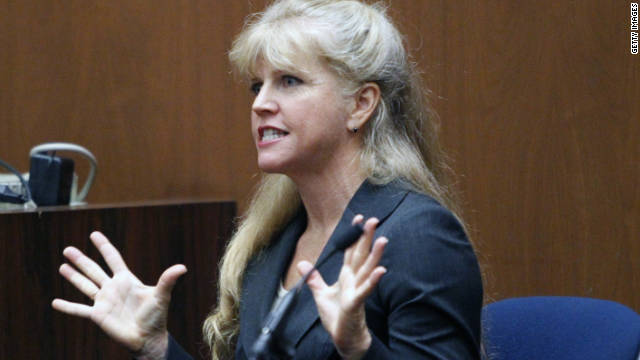 Los Angeles -- Michael Jackson slurred his speech after visits to Beverly Hills dermatologist Dr. Arnold Klein, trips that became "very regular" for the pop star in the weeks before his death, Jackson's personal assistant testified Wednesday.
Los Angeles -- Michael Jackson slurred his speech after visits to Beverly Hills dermatologist Dr. Arnold Klein, trips that became "very regular" for the pop star in the weeks before his death, Jackson's personal assistant testified Wednesday.Defense lawyers for Dr. Conrad Murray, who is on trial for involuntary manslaughter in Jackson's death, contend that Klein addicted the singer to Demerol during those visits, something Murray did not know about.
His withdrawal from that Demerol addiction was what kept Jackson awake despite Murray's efforts to put him to sleep with sedatives the morning he died, the defense contends, arguing that Klein is at least partly responsible for Jackson's death because of the Demerol.
Michael Amir Williams, who worked for Jackson the last two years of his life, was asked by defense lawyer Ed Chernoff whether he went to Klein's office with Jackson.
"At a certain point, it was very regular," Williams said.
Chernoff then asked Williams whether he'd ever heard Jackson talk slowly with slurred speech, as he did on an audio recording played in court Tuesday.
"Not that extreme, but I have heard him talk slow before," Williams said.
"And when he left Dr. Klein's office, have you observed him sometimes to talk slow?" Chernoff asked.
Sometimes, Williams replied, "he would talk slow like that. I never heard it that extreme, but I can definitely say he has come out, and he's a little slower."
Jackson security guard Faheem Muhammad, who often drove Jackson, followed Williams on the witness stand Wednesday afternoon.
"There were times he would go almost every day" to Klein's office, and Jackson often appear intoxicated when he left, Muhammad testified.
Jackson once told Muhammad that his frequent trips to the dermatologist were for treatment for a skin disease.
"My doctors tell me that I have to go, so I go," Muhammad said Jackson told him.
At the start of court proceedings Wednesday, Paul Gongaware, an executive with the company promoting Jackson's comeback concerts, said he noticed that Jackson had "a little bit of a slower speech pattern, just a slight slur in the speech" after a visit with Klein.
Medical records show that Klein gave Jackson numerous shots of Demerol in the weeks before his death, Chernoff told jurors Tuesday.
Jackson's inability to sleep the morning he died was "one of the insidious effects" of Demerol addiction withdrawal, Chernoff said. Since Murray did not know about the Demerol, he could not understand why Jackson was unable to fall asleep that morning, Chernoff said.
Los Angeles County Superior Court Judge Michael Pastor previously ruled that while the jury can see some of the records of Klein's treatment of Jackson, the doctor would not testify. Demerol was not found in Jackson's body during the autopsy, which makes Klein's testimony irrelevant, Pastor ruled.
Testimony from Williams and Muhammad included emotional details about the chaos in the Jackson home and at the hospital the day Jackson died.
Williams described Wednesday a frantic series of phone calls that started at 12:13 p.m. June 25, 2009, the day the pop icon died.
"Call me right away, please, call me right away," Murray said in a voice message to Williams, which prosecutors played in court Wednesday.
"Get here right away; Mr. Jackson had a bad reaction," Williams said Murray told him when he called him back.
Williams then ordered a security guard to rush to the upstairs bedroom where Murray was working to resuscitate Jackson.
Muhammad, one of those ordered upstairs, described seeing Jackson on a bed with his eyes open and his mouth "slightly opened" as Murray tried to revive him.
"Did he appear to be dead?" Deputy District Attorney David Walgren asked.
"Yes," Muhammad replied.
Jackson's two oldest children were standing just outside the room, watching in shock, Muhammad said.
"Paris was on the ground, balled up, crying. And Prince, he was standing there, he just had a real shocked, you know, slowly crying, type of shocked look on his face," he said.
His description of Murray's efforts to revive Jackson raised questions about Murray's knowledge of how to perform CPR.
It was several minutes before the guard called for an ambulance.
Williams and Muhammad later rode with Jackson's three children to Ronald Reagan UCLA Medical Center, following the ambulance that carried their father.
Jackson family members slowly arrived at the emergency room and joined the children, who were kept in a private room with their nanny while doctors tried to revive their father, Williams said.
"Dr. Murray and the doctors walked out, and they closed the curtain and said, 'He's dead,' " he testified.
Williams described what he called an odd request by Murray at the hospital for a ride back to Jackson's home after he was pronounced dead.
Murray told Williams he needed to go back to retrieve "some cream" from Michael's bedroom that Jackson "wouldn't want the world to know about."
The prosecution contends that Murray wanted to retrieve evidence of his medical misconduct that led to Jackson's death.
A lawyer hired by concert promoter AEG to draw up the contract with Murray testified that Murray requested a cardiopulmonary resuscitation machine and money to hire a second doctor to help him care for Jackson.
The additional doctor and the CPR equipment were never provided, since the contract was not signed before Jackson died, attorney Kathy Jorrie testified.
She told the court that it was her understanding that Murray did not want the CPR unit or the additional doctor until he arrived in London with Jackson in July 2009 for the "This Is It" concerts.
"I asked Dr Murray, why do we need a CPR machine?" Jorrie testified.
Murray told her he needed it since "given (Jackson's) age and the strenuous performance he would be putting on, that if something went wrong, he would have it," she said.
The second doctor would be necessary because "if (Murray) was tired or unavailable, he wanted to make sure there was someone else to be of assistance" to Jackson.
AEG is being sued by Jackson's mother, Katherine, based on her contention that the concert promoter hired and controlled Murray when he was caring for her son.
The prosecution contends that part of the negligence that makes Murray criminally liable for Jackson's death is the lack of monitoring and CPR equipment on hand when Jackson died.
The trial began Tuesday with prosecutors playing a stunning audio recording of an apparently drugged Jackson slurring his words weeks before his death. Prosecutors also showed jurors a photo of Jackson's corpse on a hospital gurney.
Jackson's struggle to sleep between rehearsals for his "This Is It" comeback concerts is central to the prosecution and defense theories of how the entertainer died.
Walgren blamed Murray for Jackson's death, saying he abandoned "all principles of medical care" when he used the surgical anesthetic propofol to put Jackson to sleep every night for more than two months.
The coroner ruled that Jackson's death was the result of "acute propofol intoxication" in combination with sedatives.
Defense lawyer Chernoff contended that Jackson, desperate for sleep, caused his own death by taking a handful of sedatives and drinking propofol while the doctor was out of the room.
Chernoff told the jury that scientific evidence will show that, on the morning Jackson died, he swallowed a sedative without his doctor's knowledge, "enough to put six of you to sleep, and he did this when Dr. Murray was not around."
Jackson then ingested a dose of propofol on his own, creating "a perfect storm that killed him instantly," Chernoff said.
"When Dr. Murray came into the room and found Michael Jackson, there was no CPR, no paramedic, no machine that was going to revive Michael Jackson," he said.
"He died so rapidly, so instantly that he didn't have time to close his eyes," Chernoff said.
Chernoff told jurors that Murray was trying to wean Jackson off propofol when Jackson died.
Jackson's death was "tragic, but the evidence will not show that Dr. Murray did it," Chernoff told jurors.
The prosecution contends that Murray wanted to retrieve evidence of his medical misconduct that led to Jackson's death.
Murray appeared to become emotional at one point as Chernoff presented his opening statement Tuesday morning, dabbing his eyes at times. Mostly, though, the defendant remained stoic through the proceedings.
If convicted of involuntary manslaughter, Murray could spend four years in a California prison and lose his medical license.
Prosecutors played clips from Murray's interview with investigators in which he described giving Jackson a final dose of the propofol after a long, restless night when the singer begged for help sleeping.
"The evidence in this case will show that Michael Jackson trusted his life to the medical skills of Conrad Murray, unequivocally that that misplaced trust had far too high a price to pay," Walgren said. "That misplaced trust in the hands of Conrad Murray cost Michael Jackson his life."
The most dramatic moment Tuesday came when jurors heard a May 10, 2009, recording, captured by Murray's iPhone, of Jackson "highly under the influences of unknown agents," as he talked about his planned comeback concert, according to Walgren.
"We have to be phenomenal," Jackson said in a low voice, his speech slurred. "When people leave this show, when people leave my show, I want them to say, 'I've never seen nothing like this in my life. Go. Go. I've never seen nothing like this. Go. It's amazing. He's the greatest entertainer in the world.' I'm taking that money, a million children, children's hospital, the biggest in the world, Michael Jackson's Children's Hospital."
The tape, prosecutors say, is evidence that Murray knew about Jackson's health problems weeks before his death.
Jurors also saw a video of the superstar rehearsing at the Staples Center in Los Angeles the night before he died. Jackson sang and danced to "Earth Song," the last song he would rehearse on stage.
Prosecutors also presented a photo of Jackson's lifeless body on a hospital gurney, about 12 hours later.
Producer Kenny Ortega, the first prosecution witness, said Tuesday he was jolted by Jackson's appearance when the latter arrived at a rehearsal, on June 19, less than a week before he died.
"He appeared lost and a little incoherent," Ortega said. "I did not feel he was well." Ortega said he gave the pop singer food and wrapped him in a blanket to ward off chills. Jackson watched the rehearsal and did not participate that day.
Ortega was helping Jackson prepare for the "This Is It" world tour scheduled for London's O2 Arena in autumn 2009.
In an e-mail early June 20, Ortega wrote, in part, to AEG President Randy Phillips, "My concern is, now that we've brought the Doctor in to the fold and have played the tough love, now or never card, is that the Artist may be unable to rise to the occasion due to real emotional stuff."
The producer said Jackson appeared weak and fatigued on June 19.
"He had a terrible case of the chills, was trembling, rambling and obsessing," he wrote. "Everything in me says he should be psychologically evaluated. If we have any chance at all to get him back in the light. It's going to take a strong Therapist to (get) him through this as well as immediate physical nurturing. ... Tonight I was feeding him, wrapping him in blankets to warm his chills, massaging his feet to calm him and calling his doctor."
Jackson also appeared to be scared of losing the comeback tour.
"I believe that he really wants this ... it would shatter him, break his heart if we pulled the plug," Ortega wrote. "He's terribly frightened it's all going to go away. He asked me repeatedly tonight if I was going to leave him. He was practically begging for my confidence. It broke my heart. He was like a lost boy. There still may be a chance he can rise to the occasion if (we) get him the help he needs."
AEG was the concert promoter.
Murray was unhappy that Jackson did not rehearse June 19 and told Ortega not to try to be the singer's physician, Ortega testified, adding that Jackson insisted the next day he was capable of doing the rehearsals. Jackson was a full rehearsal participant in the days before he died, the producer said.
Jackson's parents, brothers Tito, Jermaine and Randy, and sisters La Toya, Janet and Rebbie filled a row in the courtroom for a second day of the trial. Jackson's three children are not expected to attend the trial or testify, according to a source close to their grandmother, Katherine Jackson.
Testimony: Paris Jackson screamed 'Daddy!' when she saw her dying father
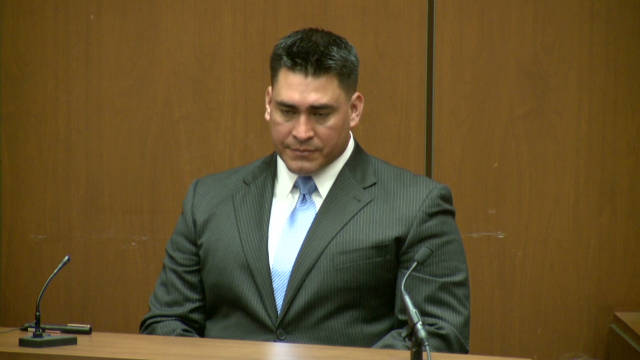 Los Angeles -- The man who called 911 to Michael Jackson's house the day he died testified Thursday that Dr. Conrad Murray told him to gather up drug vials around Jackson's deathbed before he asked him to place the emergency call.
Los Angeles -- The man who called 911 to Michael Jackson's house the day he died testified Thursday that Dr. Conrad Murray told him to gather up drug vials around Jackson's deathbed before he asked him to place the emergency call.Jackson's chef then followed on the witness stand on the third day of Murray's involuntary manslaughter trial.
Deputy District Attorney David Walgren blamed Murray for Jackson's death, saying he abandoned "all principles of medical care" when he used a makeshift intravenous drip to administer the surgical anesthetic propofol to put Jackson to sleep every night for more than two months.
The coroner ruled that Jackson's June 25, 2009, death was the result of "acute propofol intoxication" in combination with sedatives.
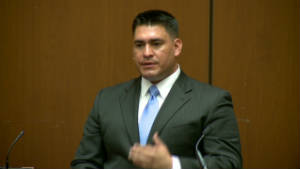 Broke MJ staffer won't do paid interviews
Broke MJ staffer won't do paid interviews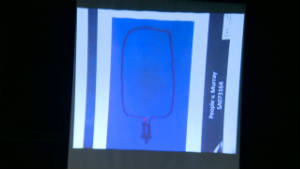 Jackson I.V. contained 'milky substance'
Jackson I.V. contained 'milky substance'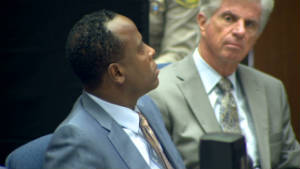 Prosecution plays Jackson 911 call
Prosecution plays Jackson 911 callAlberto Alvarez, who served as Jackson's logistics director, showed the court how he saw an empty vial of propofol inside a torn IV bag that was hanging on a stand.
During questioning by the defense, however, Alvarez indicated it was another IV bag with a clear saline solution, not propofol, that was attached by a tube to Jackson's leg.
Alvarez testified that when he first rushed into the bedroom where Murray was trying to revive Jackson, the doctor asked him to help put drug vials into bags.
"He reached over and grabbed a handful of vials, and he asked me to put them in a bag," Alvarez testified.
Prosecutors contend that Murray was trying to gather up evidence of his criminal responsibility for Jackson's death,even before asking that someone call for an ambulance.
Under cross-examination, defense lawyer Ed Chernoff led Alvarez slowly through his steps during a half-minute period, apparently trying to show that his memory is wrong about the sequence of events.
When Chernoff asked him whether all of the events he described could have happened in the 30 seconds, Alvarez answered, "I'm very efficient, sir."
Chernoff also hinted that the defense would argue that Alvarez altered his account of events two months later after conferring with other witnesses.
Alvarez described how Jackson's two oldest children, Prince and Paris, walked toward their father, who was lying still on a bed with his eyes and mouth open, facing toward them.
"Paris screamed out 'Daddy!' " and she started crying, Alvarez said.
"Dr. Conrad Murray said, 'Don't let them see their dad like this,' " Alvarez said. "I turned to the children, and I told them, 'Kids, don't worry, everything's going to be OK.' "
After helping Murray place the vials in bags, the doctor asked him to call 911. The recording of the call was played in court Thursday.
"He's pumping his chest, but he's not responding to anything," Alvarez told the emergency dispatcher.
Murray appeared not to know proper CPR techniques and attempted it on the bed and not the floor, as recommended by practitioners. Alvarez said he took over while Murray began mouth-to-mouth resuscitation on Jackson.
"After a few breaths, (Murray) said, 'This is the first time I do mouth-to-mouth, but I have to because he's my friend,' " Alvarez said.
Alvarez said he's been offered up to $500,000 for interviews about Jackson's death. He's turned them all down, despite financial problems and the lack of employment, Alvarez said.
Jackson's personal assistant and his security chief gave their own emotional details about the chaos in the Jackson home and at the hospital with their testimony Wednesday.
Michael Amir Williams, who was Jackson's personal assistant, described a frantic series of phone calls that started at 12:13 p.m. the day the pop icon died.
"Call me right away, please; call me right away," Murray said in a voice message to Williams, which prosecutors played in court Wednesday.
"Get here right away; Mr. Jackson had a bad reaction," Williams said Murray told him when he called him back.
Williams then ordered Alvarez to rush to the upstairs bedroom where Murray was working to resuscitate Jackson.
Security chief Fahreem Muhammad, who followed Alvarez upstairs, described seeing Jackson on a bed with his eyes open and his mouth "slightly opened" as Murray tried to revive him.
"Did he appear to be dead?" Walgren asked.
"Yes," Muhammad replied.
Muhammad gave details about how Jackson's two oldest children watched in shock.
"Paris was on the ground, balled up, crying. And Prince, he was standing there, he just had a real shocked, you know, slowly crying, type of shocked look on his face," he said.
Chernoff contended that Jackson, desperate for sleep, caused his own death by taking a handful of sedatives and self-administering propofol while the doctor was out of the room.
One defense strategy is to point the finger at another doctor and Jackson as having a large role in his death, while arguing that Murray was blind to what they were doing.
They contend that dermatologist Dr. Arnold Klein addicted the singer to Demerol during those frequent visits to his Beverly Hills office in the weeks before his death, something Murray did not know about.
His withdrawal from that Demerol addiction was what kept Jackson awake despite Murray's efforts to put him to sleep with sedatives the morning he died, the defense contends, arguing that Klein is at least partly responsible for Jackson's death because of the Demerol.
Chernoff asked Williams, Jackson's personal assistant, if he went to Klein's office with Jackson.
"At a certain point, it was very regular," Williams said.
Chernoff then asked Williams whether he'd ever heard Jackson talk slowly with slurred speech, as he did on an audio recording played in court Tuesday.
"Not that extreme, but I have heard him talk slow before," Williams said.
"And when he left Dr. Klein's office, have you observed him sometimes to talk slow?" Chernoff asked.
Sometimes, Williams replied, "he would talk slow like that. I never heard it that extreme, but I can definitely say he has come out, and he's a little slower."
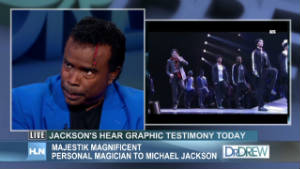 Jackson's magician: He was a class act
Jackson's magician: He was a class act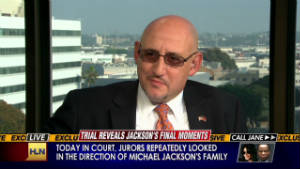 Murray trial: Jackson blame game fallout
Murray trial: Jackson blame game fallout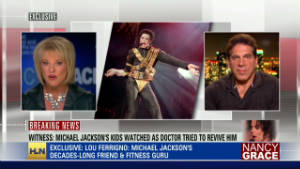 Jackson trainer, friend speaks of death
Jackson trainer, friend speaks of deathChief security guard Muhammad, who often drove Jackson, testified that "There were times he would go almost every day" to Klein's office. Jackson often appear intoxicated when he left, Muhammad testified.
Jackson once told Muhammad that his frequent trips to the dermatologist were for treatment for a skin disease.
"My doctors tell me that I have to go, so I go," Muhammad said Jackson told him.
At the start of court proceedings Wednesday, Paul Gongaware, an executive with the company promoting Jackson's comeback concerts, said he noticed that Jackson had "a little bit of a slower speech pattern, just a slight slur in the speech" after a visit with Klein.
Medical records show that Klein gave Jackson numerous shots of Demerol in the weeks before his death, Chernoff told jurors Tuesday.
"Dr. Klein did not do anything that was medically inappropriate," Klein's lawyer, Garo Ghazarian, told HLN's "Issues with Jane Velez-Mitchell" Wednesday.
The last time Klein gave Jackson drugs was more than three days before his death, Ghazarian said.
Jackson's inability to sleep the morning he died was "one of the insidious effects" of Demerol addiction withdrawal, Chernoff said. Since Murray did not know about the Demerol, he could not understand why Jackson was unable to fall asleep that morning, Chernoff said.
Los Angeles County Superior Court Judge Michael Pastor previously ruled that while the jury can see some of the records of Klein's treatment of Jackson, the doctor would not testify. Demerol was not found in Jackson's body during the autopsy, which makes Klein's testimony irrelevant, Pastor ruled.
A lawyer hired by concert promoter AEG to draw up the contract with Murray testified that Murray requested a CPR machine and money to hire a second doctor to help him care for Jackson.
The additional doctor and the CPR equipment were never provided, since the contract was not signed before Jackson died, attorney Kathy Jorrie testified.
She told the court that it was her understanding that Murray did not want the CPR unit or the additional doctor until he arrived in London with Jackson in July 2009 for the "This Is It" concerts.
"I asked Dr Murray, why do we need a CPR machine?" Jorrie testified.
Murray told her he needed it since "given (Jackson's) age and the strenuous performance he would be putting on, that if something went wrong, he would have it," she said.
The second doctor would be necessary because "if (Murray) was tired or unavailable, he wanted to make sure there was someone else to be of assistance" to Jackson.
AEG is being sued by Jackson's mother, Katherine, based on her contention that the concert promoter hired and controlled Murray when he was caring for her son.
The prosecution contends that part of the negligence that makes Murray criminally liable for Jackson's death is the lack of monitoring and CPR equipment on hand when Jackson died.
The trial began Tuesday with prosecutors playing a stunning audio recording of an apparently drugged Jackson slurring his words weeks before his death. Prosecutors also showed jurors a photo of Jackson's corpse on a hospital gurney.
If convicted of involuntary manslaughter, Murray could spend four years in a California prison and lose his medical license.
Subscribe to:
Comments (Atom)
